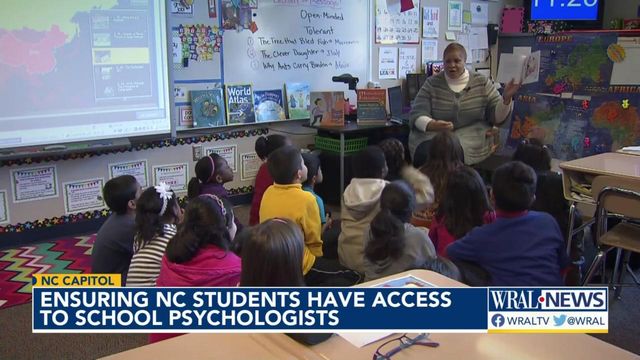NC education officials float school psychologist internship program, more funding for school buses
Even with funding, schools have struggled to hire school psychologists.
Posted — UpdatedNorth Carolina Department of Public Instruction and State Board of Education will finalize a request before the board’s May meeting.
In a preliminary proposal presented this week, department officials said they want $4.5 million to start a school psychologist internship program. Interns would work at North Carolina schools while completing their university degrees and, ideally, stay on as employees of those schools once their internships conclude.
The internship program could help improve the pipeline of school psychologists in the state by attracting school psychology students at universities in other states to come to North Carolina, DPI Director of Legislative and Community Affairs Jamey Falkenberry told the State Board of Education this week.
School psychologists work with students with disabilities, both in identifying disabilities and often serve on those students' individualized education program teams. They can also provide mental health services to students.
Funds for school psychologists only became available in January.
Still, Falkenberry he’d already heard from school district leaders they weren’t having any success hiring when they did have money. He’d asked if anyone had.
“Barely anybody raised their hand,” Falkenberry said. “One superintendent said, ‘We can’t find them, and they don’t exist.’”
State leaders are also floating:
- $5.6 million more for school buses, largely in light of rising diesel prices. These dollars are subject to change before a request would be made.
- $3 million for cost-of-living adjustments for teachers and state-sector employees related to inflation
- 13 more DPI employees, most of them focused on school turnaround
- Make tuition reimbursement for teacher assistants working toward teaching degrees recurring funding. This has been recurring funding but was changed to non-recurring under the new state budget.
A new school psychologist pipeline
Hiring school psychologists has a variety of challenges that extend beyond funding for positions for them. School psychology degree programs require more intensive supervision and years of work than other psychology programs, and North Carolina universities have few new openings for students each year.
On top of that, school psychologist advocates have long criticized the low pay of school psychologists in North Carolina, which tops out tens of thousands of dollars below other states’ or what other employment sectors offer people with doctoral-level psychology degrees.
The proposed internship program is intended to reach students whose universities require internships in school psychology, primarily out of state. In some other states, such as New York and Pennsylvania, universities produce more school psychologists than job openings available for them in any given year.
Some internships exist in North Carolina, but the state itself does not run a program. Falkenberry said states with more school psychologists have their own internship programs, helping building their pipeline of school psychologists for schools to hire.
DPI spokeswoman Blair Rhoades said officials aren’t worried about potential problems caused by other states hiring school psychologists with federal pandemic relief money, because this proposal is only an internship program.
During the State Board of Education meeting, Board Member Olivia Oxendine said North Carolina should eventually find more local ways of increasing the school psychologist pipeline, specifically through educator preparation programs.
“We’re going to have to encourage our EPPs to begin school psychology programs,” Oxendine said.
DPI has also floated asking lawmakers to give schools the ability to convert school psychologist positions to other mental health professionals if they can’t hire a school psychologist.
The state has allocated $34 million to 114 school districts for school psychologists. In terms of positions, that’s yielded 420 school psychologists funded for 106 school systems, though it’s not clear that 420 people are working in those positions.
All 115 school districts are required to employ at least one school psychologist by the next school year, and the new state budget will cover their costs.
The North Carolina School Psychologists Association noted to WRAL News that the state has not yet hired a recruiter for school psychologists. That should help, the group said, along with a $3,500 salary bump and funding for more school psychologists.
The group does "hope and expect this to positively impact school psychologists before the next school year begins."
State data on school psychologists, funded from a variety of sources, show 800 school psychologists employed this year.
That’s about typical compared to recent years.
To meet the nationally recommended ratio of students to school psychologists, the state would need to more than double its school psychologists.
Rising fuel costs for school buses
DPI officials said they want $3 million for school buses to cover higher cost of diesel and nearly $2.5 million to cover inflation-related costs related to transportation.
Earlier this year, DPI estimated counties could end up having to pay $10 million in unexpected fuel costs if the state didn't provide more money for fuel. That estimate has not changed.
The department will, in the meantime, survey the state’s schools on their fuel needs. The department has $4.7 million unspent in the transportation fund that schools could apply to use.
Schools must prove they have a need and that they have not transferred funds out of their transportation allotment for other expenses.
That represents about 1% of the $470.9 million the state has allocated to transportation this school year.
Related Topics
• Credits
Copyright 2024 by Capitol Broadcasting Company. All rights reserved. This material may not be published, broadcast, rewritten or redistributed.






